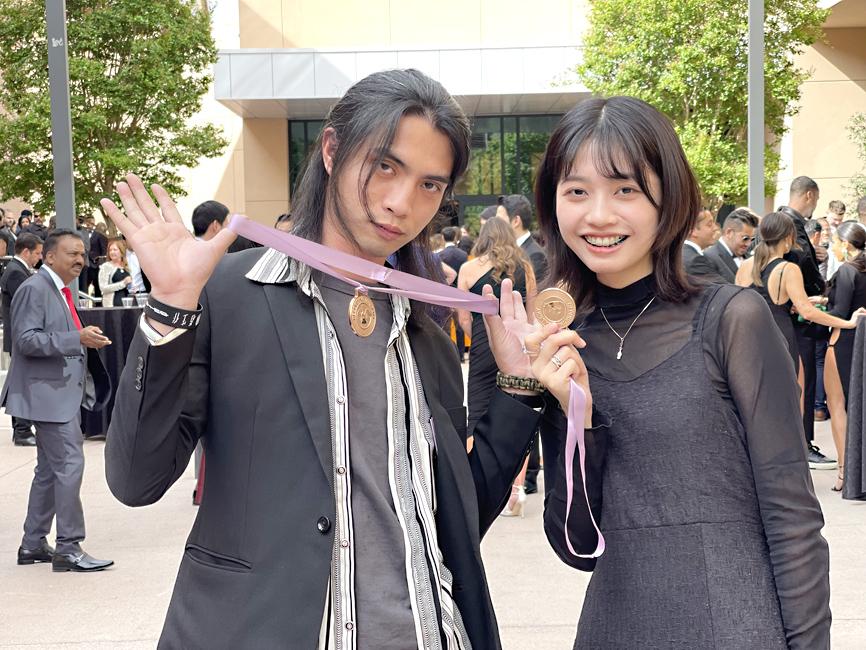Taiwanese designers Li Jheng-han (李政瀚) and Yu Wei (于薇) won the Best Recording Package award at the Grammy Awards in Las Vegas on Sunday with their design for the album Pakelang (八歌浪) by Taiwan’s Second Generation Falangao Singing Group and the Chairman Crossover Big Band.
The award is one of a series of Grammys presented for an album’s visual art. It is presented to the art directors of the winning albums, not the performers.
Li and Yu were joined onstage by Yeh Tzu-yin (葉紫音), who delivered an acceptance speech in English on their behalf.

Photo: CNA
Yeh said that the duo were thrilled to take part in the Grammys because of their work on the album.
The album cover features an abstract relief design depicting waves on Taiwan’s coastline that is opened in layers.
The design was inspired by the environment around Falangao, an Amis ocean village in eastern Taitung County, said Wind Music, which produced the album.

Photo: CNA
In the acceptance speech, Yeh said that the designers were happy to help people around the world learn more about Taiwan, which is “a beautiful and a peace-loving country.”
“I hope someday you can go and visit Taiwan, and everyone is super welcome,” Yeh said on their behalf.
The nominees included another Taiwanese, Xiao Qing-yang (蕭青陽), for his work on the album Zeta by Soul of Ears. It was his sixth Grammy nomination.
The Grammy Awards were held at the MGM Grand Garden Arena in Las Vegas on Sunday.

CHAOS: Iranians took to the streets playing celebratory music after reports of Khamenei’s death on Saturday, while mourners also gathered in Tehran yesterday Iranian Supreme Leader Ayatollah Ali Khamenei was killed in a major attack on Iran launched by Israel and the US, throwing the future of the Islamic republic into doubt and raising the risk of regional instability. Iranian state television and the state-run IRNA news agency announced the 86-year-old’s death early yesterday. US President Donald Trump said it gave Iranians their “greatest chance” to “take back” their country. The announcements came after a joint US and Israeli aerial bombardment that targeted Iranian military and governmental sites. Trump said the “heavy and pinpoint bombing” would continue through the week or as long

TRUST: The KMT said it respected the US’ timing and considerations, and hoped it would continue to honor its commitments to helping Taiwan bolster its defenses and deterrence US President Donald Trump is delaying a multibillion-dollar arms sale to Taiwan to ensure his visit to Beijing is successful, a New York Times report said. The weapons sales package has stalled in the US Department of State, the report said, citing US officials it did not identify. The White House has told agencies not to push forward ahead of Trump’s meeting with Chinese President Xi Jinping (習近平), it said. The two last month held a phone call to discuss trade and geopolitical flashpoints ahead of the summit. Xi raised the Taiwan issue and urged the US to handle arms sales to

BIG SPENDERS: Foreign investors bought the most Taiwan equities since 2005, signaling confidence that an AI boom would continue to benefit chipmakers Taiwan Semiconductor Manufacturing Co’s (TSMC, 台積電) market capitalization swelled to US$2 trillion for the first time following a 4.25 percent rally in its American depositary receipts (ADR) overnight, putting the world’s biggest contract chipmaker sixth on the list of the world’s biggest companies by market capitalization, just behind Amazon.com Inc. The site CompaniesMarketcap.com ranked TSMC ahead of Saudi Aramco and Meta Platforms Inc. The Taiwanese company’s ADRs on Tuesday surged to US$385.75 on the New York Stock Exchange, as strong demand for artificial intelligence (AI) applications led to chip supply constraints and boost revenue growth to record-breaking levels. Each TSMC ADR represents

State-run CPC Corp, Taiwan (CPC, 台灣中油) yesterday said that it had confirmed on Saturday night with its liquefied natural gas (LNG) and crude oil suppliers that shipments are proceeding as scheduled and that domestic supplies remain unaffected. The CPC yesterday announced the gasoline and diesel prices will rise by NT$0.2 and NT$0.4 per liter, respectively, starting Monday, citing Middle East tensions and blizzards in the eastern United States. CPC also iterated it has been reducing the proportion of crude oil imports from the Middle East and diversifying its supply sources in the past few years in response to geopolitical risks, expanding